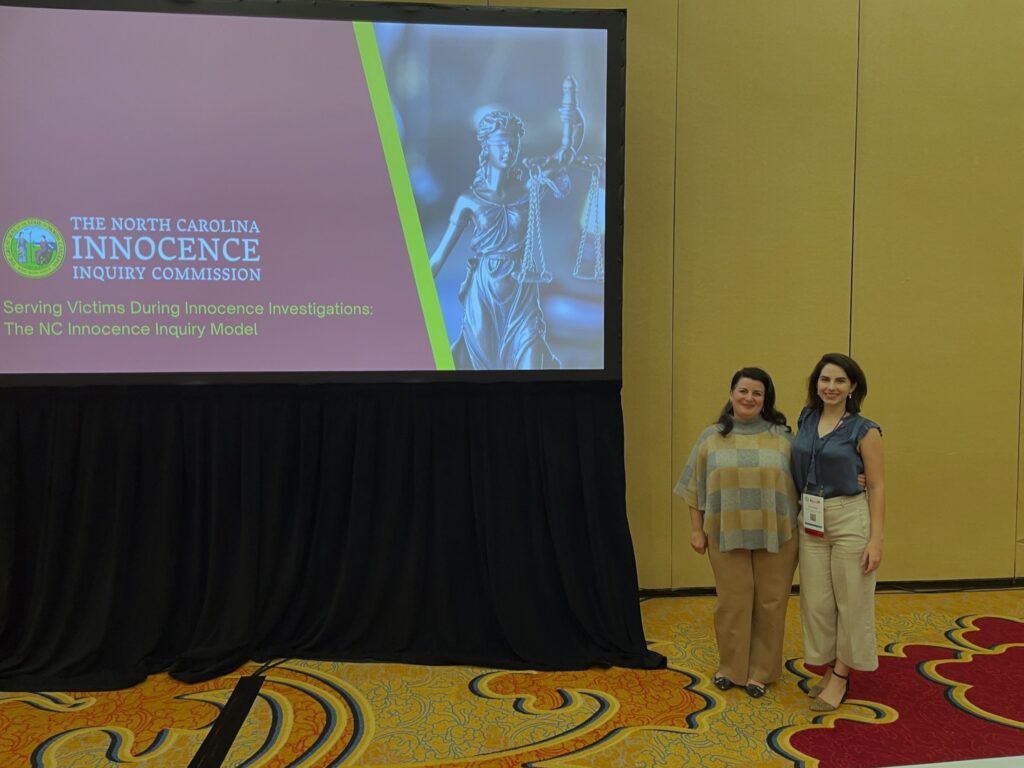Welcome to our Summer 2023 newsletter!
In this edition, we will discuss the Commission’s victim services program. We are proud of the work we have done to make the Commission a more trauma- informed agency, and we have certainly learned some lessons along the way. There are very few services built for victims in the post-conviction space, and we hope to share our successes and challenges with all criminal justice stakeholders who interact with crime victims!
History of the Victim Services Program
In 2019, Commission leadership sought grant funding to build a victim services program for crime victims and their loved ones impacted by Commission investigations. Leadership saw that victims who participated in the hearing and exoneration process were left to navigate the complex and often retraumatizing post-conviction space with few resources tailored to assist them. When the Commission received a 2019-2021 Victims of Crime Act (VOCA) Grant, we began building services that would empower victims to meaningfully participate in the Commission process.
The goals of this first VOCA grant were to create a position that would be solely dedicated to victim services, lessen the financial burden for victims and their support people who choose to attend hearings by covering the cost of travel, and share lessons learned from this uniquely impacted population with other stakeholders in the criminal justice system. Once we began moving toward these goals, we found that the work itself demanded we widen our scope. To empower victims to meaningfully participate in the Commission process, we would need to incorporate trauma-informed principles throughout the agency.
The victim services program now consists of several crucial components. The Victim Services Program Manager provides information and support to crime victims and their loved ones and consults with investigative staff on trauma- informed interviewing practices and best approaches when engaging with vulnerable populations. Every staff member receives extensive training on understanding trauma and how it may impact investigations. In addition to covering the cost of victims’ travel to Commission hearings and three-judge panels, the program provides funding for safety planning and counseling if the case results in the release or exoneration of a claimant. The work of the program is supported through a network of relationships the Commission has built with leading victim services organizations, ensuring that we can provide the best referrals for victims of crime.
As of 2022, the victim services program is supported by recurring state funding. Last year, the Commission received a new 2022-2024 VOCA Grant to fund an innovative partnership with the national nonprofit Healing Justice. Through this partnership, the Commission can now provide restorative justice services to crime victims, exonerees, and others impacted by exonerations.
Applying Trauma-Informed Principles in Commission Investigations
The Substance Abuse and Mental Health Services Administration (SAMHSA) defines the trauma-informed approach:
“A program, organization, or system that is trauma-informed realizes the widespread impact of trauma and understands potential path for recovery; recognizes the signs and symptoms in clients, families, staff and others involved with the system; and responds by fully integrating knowledge about trauma into policies, procedures, and practices, and seeks to actively resist re-traumatization.” (Substance Abuse and Mental Health Services Administration, 2014, p.9)
When the Commission expanded its services to crime victims, becoming a more trauma-informed agency was central to that work. Trauma is an experience that collides with a person’s understanding of oneself, others, and the world. It is defined by terror, fear, and lack of control. Combating trauma in crime victims requires re-establishing a sense of control. In practice, that sense of control is rebuilt through timely and thorough notification of the investigation, tailoring the level of participation in the innocence investigation and hearing process to the victim’s individual needs, and information and preparation for any next steps.
For Commission staff, training on trauma, how trauma may impact investigative interviews, and secondary traumatic stress builds competency and resilience. Commission staff report that trauma-informed practices allow them to better communicate with witnesses, victims, and other members of the community, leading to more productive and positive interviews. Understanding how the proximity to others’ trauma may impact our staff allows staff to take better care of their well-being and avoid compassion fatigue. Trauma-informed practices improve outcomes for crime victims, but as importantly, improve outcomes for the staff investigating a traumatic event.
Outcomes
In the 2 years prior to the start of the victim services program, crime victims responded to Commission contact at a rate of 22%. Since establishing the program, 73.5% of crime victims and loved ones contacted by the Commission make use of the information and resources offered. 56.8% of victims served are survivors of homicide, 62.7% are African American or multiracial, and 49% reside in rural counties. Although the Governor’s Crime Commission considers these populations to be underserved, the Commission has worked to build a program that circumvents some of the barriers to receiving services.
The goal of the victim services program was to not simply hold space for victims to participate in the Commission process, but to invite and support them in participating. The Commission’s statute includes a set of victims’ rights, but without information, support, and compassion few choose to act on those rights. Becoming a more trauma-informed and victim-centered agency is a process, and it is a process in which every staff member plays a role.
Future of the Victim Services Program
With these concrete outcomes, Commission leadership was able to impress the value of the program on members of the General Assembly. The General Assembly’s decision to provide recurring funds to support the victim services program allowed us to further broaden of scope of services. We are now working to build an exoneree services plan that will provide a safety net to exonerees upon release from prison and re-entry into the community.
We are continuing to learn from this work and appreciate any opportunities we have to share lessons with other agencies and organizations. To date, 453 criminal justice stakeholders have received training on the Commission’s victim services program. If your organization is interested in receiving training on implementing post-conviction victim services and understanding the impact of post-conviction case activity and innocence investigations on victims of crime, please contact us.

Please keep an eye out for our next Newsletter in October.

